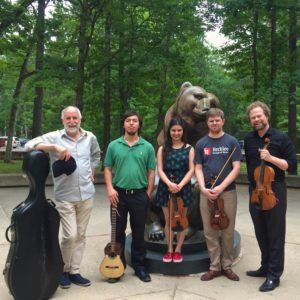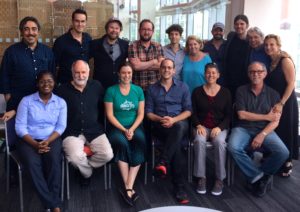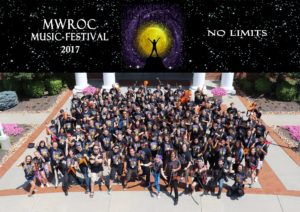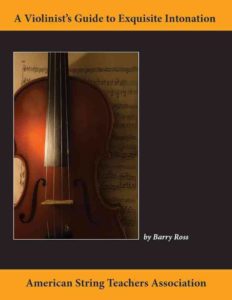So you’re back from music camp! At their best, music camps are radical catalysts for learning. Your mind brims with memories, teachings, discoveries, and good intentions for continuing your development. You’re determined to return the following year a much-improved musician.
Sadly, our best intentions for self-improvement often go unrealized unless we apply discipline, strategy, planning, and accountability. Let’s take some practical steps to ensure that we maximize our newly gained potential.
Note: if you’re still grappling with the transition to normal life, read Music Camp Withdrawal Syndrome – A Survivor’s Guide. Once your body, mind, and feelings have regrouped a bit, get to work!
Gather New Materials (and Start Using Them!)

At music camp we often learn about supplemental materials for deepening our understanding, expanding our repertoire, and helping us to practice and improve. Although we may have obtained many of these items at camp, we seldom return home with everything we intend to investigate, read, or buy.
Make a shopping list, prioritize, and purchase. Get that recording app, those scale or etude books, that recording you want to study or transcribe. Borrow items from a library. If you missed details and need to contact someone for correct titles or more information, do so.
If you’ve already gathered your new materials, devise a plan for using them. Then, implement it before the week is over. Remove and discard any shrink-wrap, and put sheet music on your stand. Now, let’s get ready to practice. . .
Revisiting Music Camp Lessons
Next, revisit your daily schedules. Read any notes that you took, and listen to recordings you made of classes. -You did record classes and lessons didn’t you? If not, there’s a good chance that a friend or colleague did. Hunt the recordings down if you can.
Write out a summary each session, or recap them by recording a voice memo or video reflection. What did you learn? What were the “big truths?” List the exercises and studies you received, and write down everything you want to implement.

I often leave music camp with very specific ideas for how I can improve, but unless I make a follow-up plan, nothing changes. To prevent that from happening to you, I suggest that you try the 100 Points of Awesomeness exercise. . .
A Hundred Points of Awesomeness

In my late teens, I often wished that I could be better in certain aspects of my playing and musicianship. One day, I asked myself, “If I had a hundred ‘improvement points’ to invest in my musicianship, how would I spend them?”
I made a mental list allotting the hundred points to different aspects of my playing (I devoted ten points to tenths- at the time I was wrestling with a couple of tricky Paganini caprices in my violin lessons). After specifying exactly what I wanted to improve, I adjusted my practice time strategically. Once I reorganized my practice schedule to include my new goals, I started developing my unrealized potential.
Music camp just gave you 100 Points of Musical Awesomeness to invest in your own development. Fantasize. What do you want to improve? What do you know you need to improve? Practice time is finite, so focus your energy by dividing your 100 points of awesomeness across just a few select topics.
Once you follow through, a year from now, you will be at least 100 points more awesome than you presently are. If you achieve your goals sooner, give yourself 100 additional points to distribute.
Your distribution of the 100 points is totally up to you, but it could look something like this:
- 30 points: Play better in tune.
- 30 points: Improve my timing and rhythm.
- 25 points: Get better at improvising solos.
- 15 points: Develop better confidence and stage presence when performing.
So, let’s break that down.
Pursuit of Awesomeness
 #1: Better intonation means committing to daily scale and arpeggio practice. Record and critique yourself; practice with drones. Research the topic using published resources like Barry Ross’s A Violinist’s Guide to Exquisite Intonation. While your technical regimen will naturally include intonation work, also focus on it in your repertoire practice.
#1: Better intonation means committing to daily scale and arpeggio practice. Record and critique yourself; practice with drones. Research the topic using published resources like Barry Ross’s A Violinist’s Guide to Exquisite Intonation. While your technical regimen will naturally include intonation work, also focus on it in your repertoire practice.
#2: For improved timing, work daily with a metronome, drum machine, or accompaniment track. Moreover, play along with recordings by bands with great groove. (Try practicing your scales to Earth, Wind, & Fire songs in the same key).
Reading scores, conduct along with recordings, or practice rhythmic exercises away from your instrument. Check out Robert Starrer’s Basic Rhythmic Training or Rhythmic Training. Drumming methods such as Kim Plainfield’s Advanced Concepts: A Comprehensive Method for Developing Technique, Contemporary Styles and Rhythmical Concepts are also helpful. Because good timing means tapping into group rhythm, plan readings, jams, rehearsals, and concerts with others.
#3: To get better at improvisation, you must be specific. What do you want to improve? Free improvisation, 12-bar blues, the 8-bar country music solo, navigating chord changes from a lead sheet? Using your camp notes to guide you, set some specific objectives. Write out a plan so that every day, you’re making strides.
#4: To improve stage presence, you need an audience. Make a plan for performing publicly on a weekly basis. Find a venue. Cafés, retirement communities, houses of worship, and public spaces are a few places where you can build your stage presence.
Start with a comfortable setting, and play repertoire that you know very well. If you don’t feel ready for the public, perform for family, friends, or even pets. Video your performances so that you can review, critique, and improve. If you wrestle with performance anxiety, check out my Conquer Stage Fright YouTube video series.
Establish a Music Camp Accountability Partner or Group
Once you have a plan, hold yourself accountable for it. Better yet, get an accountability partner or a support group to keep each other accountable and motivated. Share your goals for the month and the week, and check in with each other every few days. Make recordings and videos and give each other feedback. Always celebrate progress and encourage one another.
Online Learning Communities and Lessons
Online communities can further boost accountability. Consider starting a small online group to share and report back on a daily basis (twelve or fewer members; smaller is better).
Today, many music camp faculty members also teach with online subscription sites that offer lessons and a built-in learning community. I teach lessons focused on violin and viola technique, peak performance, memorization, and much more at MyTalentForge.com. Until Labor Day, you can use the discount code DocWallace for 20% off on your subscription.
Get Radical!
As you can see, it’s possible to carry the music camp experience across the entire year. Get your materials together, review your learning, strategize for improvement, make plans, and belong to an accountable learning community. May your music camp experience be a catalyst for radical improvement, growth, and change!
-Doc Wallace, August 5, 2017
Dr. David Wallace serves as String Chair of Berklee College of Music, and teaches online string lessons at MyTalentForge.com. During the summer, catch him at Berklee College of Music’s Global String Intensive, Five Week Summer Performance Program, and Mark Wood Rock Orchestra Camp.
[…] your next camp. Once you’ve had a chance to regroup and rest, move on to part two of this blog, Music Camp as Radical Catalyst. Turn your MCWS into motivation, so that you can maximize what you learned this […]